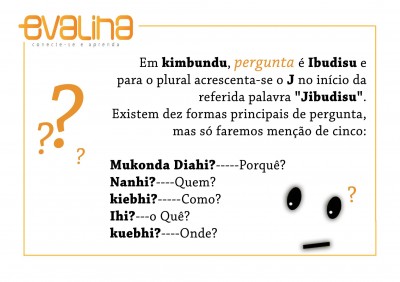[All links lead to Portuguese-language webpages unless otherwise noted.]
“On average, a language disappears every two weeks, and Africa is the continent most at risk”, wrote the author José Eduardo Agualusa in a 2011 article on the evolution of languages in Angola. However, during the past year a number of online platforms have been created with the aim of protecting Angola's national languages.
Angola is a plurilingual country [en], with six African languages recognised as national languages as well as Portuguese as the official language. Besides this, it is estimated that there are 37 languages and 50 dialects in use in the country. At the end of October 2013, the blog Círculo Angolano Intelectual (Angolan Intellectual Circle) reported that 30 percent of the Angolan population (almost 8.5 million Angolans) “only speak national languages which are not featured in any educational or social program”, adding that:
isto é mais um dos factores que gera exclusão social.
this is another of the factors that provoke social exclusion.
In an article [pdf] by Agualusa, published by Casa das Áfricas, a Cultural Institute for Training and Study on African Societies in São Paulo, the prizewinning author considers a “proposal for peace” for the coexistence of the national languages with the Portuguese language (“mother tongue versus stepmother tongue”) and poses the question:
Porquê que é que em Angola, país de muitas línguas, os escritores apenas utilizam o português?
Why is it that in Angola, a country of many languages, writers only use Portuguese?
In an attempt to counter the phenomenon, various online initiatives were created during 2013 by young people who view the new technologies as a tool for the promotion and protection of national languages.
One project, still in its initial phase, which aims to promote learning of the Angolan national languages in an innovative way, free of charge and accessible to everyone with access to the Internet, is Evalina.
Created in May 2013 by Joel Epalanga, an IT project manager in the telecommunications sector, the primary motive for the creation of the platform was the observation that there is a gap faced by many young people with regard to the national languages. The proposal was explained in an interview in the magazine Jovens da Banda:
[para que] os jovens, que hoje em dia gastam boa parte do seu tempo livre na internet, pudessem dedicar algumas horas para aprender um pouco a (sua) língua nacional de preferência.
[so that] young people, who these days spend a large part of their free time on the Internet, could dedicate a few hours to learning a little of (their) preferred national language.
Evalina consists of a Facebook page where content such as incentives to learn and lessons on national languages are shared. At the date of publication of this article, the page featured lessons on Umbundu [en], the second most-spoken language after Portuguese, and on Kimbundo [en].
In February 2013, a platform for Angolan slang, Kallun [pt], already warranted a note on Global Voices. The project aims to “create a space where [Angola's] slang and colloquial language is explained so that everyone can understand it”, and uses social networks to promote sharing and learning in an informal manner.
Another project which stands out is the Ngola Yetu Dictionary, a dictionary and online translator for Angolan national languages “developed with the goal of reinforcing Angolan culture and increasing its use among young people”. With a simple and intuitive design not unlike Google, it works as a search engine between the Kikongo, Kimbundo, Umbundo and Portuguese languages. The project has used Facebook and Twitter to interact with web users.
For the preservation of mother tongues
The importance of the inclusion of national languages in teaching is recognised by institutions and academics alike. In the middle of June 2013, the Angolan portal Mwelo Weto published an interview with Daniel Peres Sasuku, an Angolan linguist and lecturer in the Faculty of Arts of the Agostinho Neto University, who advocates for the prioritisation of national languages in teaching:
Pensamos, de igual modo que a implementação dessas línguas no ensino é uma forma mais concreta de seu resgate e preservação enquanto patrimônio cultural dos angolanos
We think, equally, that the inclusion of these languages in teaching is a more concrete means of rescuing and preserving them as part of the cultural heritage of the Angolan people.
The Regional Forum for University Development (FORDU) also supports the idea that national languages should be a compulsory discipline in schools. Of the recommendations which were made following a debate organised by FORDU last April, 2013, under the theme “the national languages as true identity heritage of the Angolan people”, the following stands out:
Angola continua uma sociedade plural do ponto de vista das línguas, tradições, cultura (diversidade cultural) tal situação faz de Angola um País rico em cultura, mas precisa política séria de promover as Línguas todas e dar maior grandeza nas Línguas Nacionais, principalmente as mais faladas como Umbundo.
Angola continues to be a plural society from the point of view of its languages, traditions and culture (cultural diversity). This situation makes Angola a country rich in culture, but serious policies are necessary to promote all languages and give a greater importance to the national languages, above all the most widely spoken such as Umbundo.
Between 2004 and 2010, a trial was carried out to introduce seven national languages in a series of schools in the country. The Ministry of Education declared in September 2013 that it plans to expand the teaching of national languages into all primary schools. A bill on the Statute of National Languages in Angola “to promote social inclusion and strengthen unity in ethnolinguistic diversity” is in its concluding phase.
Meanwhile, artists – in this case singers – have also recommended the use of national languages in their songs.
Do you know of any other online initiatives for the preservation or teaching of Angola's various languages? Leave us a comment!








7 comments